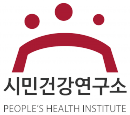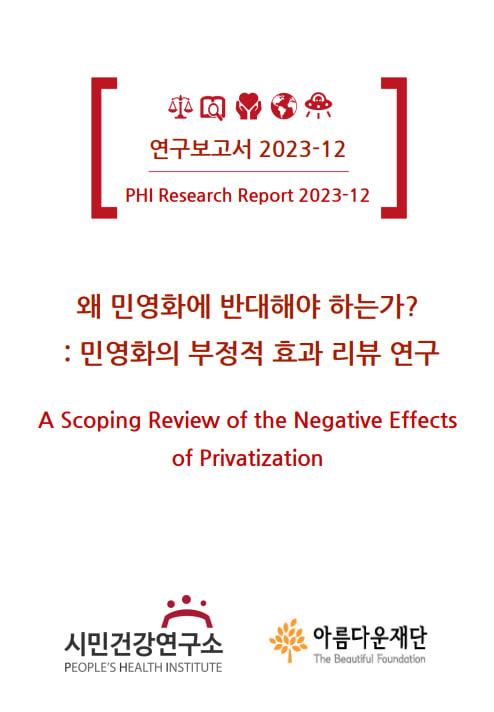시민건강연구소가 2023년 공동 연구과제로 진행한 <왜 민영화에 반대해야 하는가? : 민영화의 부정적 효과 리뷰> 연구보고서를 공개합니다.
다들 잘 아시겠지만, 지난해 출범한 윤석열 정부는 여러 분야에서 간접적이고 우회적인 형태로 민영화 정책을 추진하고 있습니다. 민영화는 사회 필수서비스의 공공성을 약화시킴으로써 시민들의 삶을 위협하고 무엇보다 사회적 불평등을 악화시킨다는 점에서 반드시 저지해야 합니다.
민영화 반대의 필요성에 대해 보다 많은 이들이 공감하고 함께 연대하는 데 기여하기 위한 학술적 실천의 일환으로 그동안 민영화가 어떤 영향을 미쳤는지 분석한 기존 연구들을 고찰하였습니다.
연구 결과, 그동안 주로 경제적 효율성의 차원에서 민영화의 긍정적 영향을 규명한 연구들이 많이 이뤄져 왔다는 사실을 확인할 수 있었습니다. 반면 민영화가 건강불평등과 삶의 질, 인권 등에 미치는 영향을 분석한 연구는 드문 실정이었습니다. 우리는 이것을 신자유주의적 연구 패러다임과 지식 생산 체제로부터 기인한 결과로 봐야 한다고 생각합니다.
이 연구는 여러 제한점을 안고 있지만, 앞으로 이어질 민영화 대응 연구의 징검다리 역할로 이해해주시면 좋을 것 같습니다. 연구보고서에 대한 많은 관심과 건설적 비판을 부탁드리며, 사람 중심 관점에서 민영화를 비판하고 사회 공공성을 강화하기 위한 연구 활동에 많은 분들이 함께 할 수 있기를 기대합니다.
(12/8 보고서 발간 이후 일부 내용이 수정, 보완되었습니다. 해당 내용은 첨부한 보고서의 수정사항 표를 참고 바랍니다)
이 연구보고서는 아름다운재단의 2023 변화의시나리오 스폰서 지원사업의 지원으로 진행되었습니다.
목차
1. 서론
1.1. 연구 배경과 목표
1.2. 이론적 고찰
1.3. 연구 구성
1.4. 연구의 틀
2. 분석1: 보건의료 부문의 민영화 영향에 대한 문헌고찰 연구
2.1. 연구 방법
2.2. 연구 결과
2.3. 고찰
3. 분석2: 비보건의료 부문의 민영화 영향에 대한 문헌고찰 연구
3.1. 연구 방법
3.2. 연구 결과
3.3. 고찰
4. 결론
참고문헌
Abstract
Objectives
Since the conservative government came to power last year, the trend of privatization has been getting stronger. Privatization jeopardizes the lives of citizens by weakening the publicness of essential social services. In order to strengthen social public opinion against privatization, it is necessary to provide an academic ground for the negative consequences of privatization.
Methods
This study selected and reviewed literatures that analyzed the results of privatization in the fields of health care and non-health care using the ‘scoping review’ method.
Results
In the field of health care, there were 27 literatures that met the research questions and selection criteria. There were 14 studies confirming the negative impact of privatization, 5 studies reporting positive effects, and 8 studies identifying mixed effects. Privatization of health care has usually been shown to limit access to care for low-income patients and worsen working conditions for workers. There were many studies conducted focusing on economic efficiency rather than the effect of privatization on health conditions and quality of care.
In the non-health care field, 100 studies were selected to analyze the impact of privatization. Of these, 57 were studies that analyzed economic efficiency or productivity. The remaining 43 literatures included the results of privatization in the fields of water, welfare, education, prisons, electricity, energy, and housing. Unlike the health care field, studies reporting positive results of privatization occupied a relatively larger proportion. Few studies have analyzed the effects of privatization on inequality, quality of life, and human rights.
Conclusions
The fact that many studies have focused on the positive impact of privatization, mainly in terms of economic efficiency, may be the result of the neoliberal research regime. In the future, it is necessary to conduct more active research to analyze the impact of privatization on health inequality, quality of life, and human rights from a people-centered perspective.

